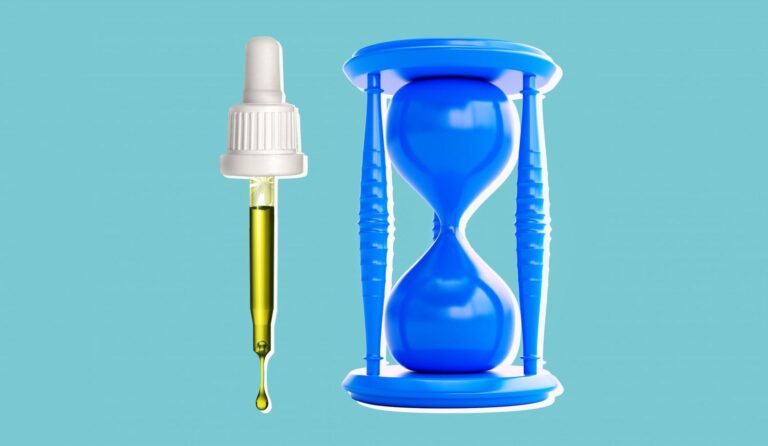CBD is a natural compound found in the flowers and leaves of the cannabis plant. It doesn't contain THC, so you won't get high no matter how much you take. The effects of CBD vary depending on the type of product and the strength of that product.
The time it takes to feel the effects also varies. That's why we spoke to experts to find out what CBD is, its potential benefits, from improving sleep to relieving muscle pain, and how long it takes to start seeing results after using the product. We talked in detail about how much it would cost.
Possible benefits and effects of CBD
CBD has a long and convincing list of potential health benefits. However, it is worth noting that CBD products have not been approved by the FDA, but the FDA “recognizes the potential opportunities that cannabis or cannabis-derived compounds may offer and We recognize the great interest in
Research into the benefits of CBD is ongoing, but in the meantime, many people want to try out this ingredient's positive potential. Here are some of the biggest potential benefits from CBD.
Reduces muscle pain and inflammation
CBD interacts with the body's endocannabinoid system to reduce inflammation and modulate pain signals. This is why it is so commonly used among athletes and people with chronic pain conditions. It helps relieve pain and muscle tension without causing a high enough to affect sports performance or daily activities.
relieve anxiety and stress
CBD has a calming effect and can help reduce symptoms of anxiety and stress. This is because it interacts with serotonin receptors in the brain. Many people who use CBD report feeling more relaxed and focused without the psychoactive effects of THC.
cure nausea
CBD can also help manage nausea. This is also due to its effects on serotonin receptors, which are involved in the brain's response to nausea and vomiting. Many people undergoing chemotherapy or with digestive disorders use CBD products to prevent and treat nausea.
improve sleep
CBD can help relieve muscle pain and stress, so it's no wonder it can help improve your sleep quality. After all, these are common causes of insomnia. CBD's relaxing effects may help users fall asleep faster and get more restful, uninterrupted sleep.
Effects of CBD based on administration method
A common question for people trying CBD for the first time is, “How long does it take for my body to see the effects?” According to Boris Sharansky, Papa & Berkeley's chief operating officer, that period largely depends on the method of administration. Here's a quick breakdown.
Topical forms of CBD
CBD topical products such as balms, salves, and lotions should provide near-immediate results. After applying these products, you should begin to feel relief from inflammation and certain skin conditions within about 15 minutes. Effects usually last about 2 to 6 hours, depending on the dose and the severity of the condition being treated.
Ingestible forms of CBD
Results may vary for ingestible products such as tinctures, capsules, and gummies. When a tincture is placed under the tongue, it is usually absorbed within 30 seconds and the effects are felt within 15 minutes. When you ingest CBD (that is, swallow CBD or consume food containing CBD), you can expect to feel the effects within about 45 minutes to two hours. The effects can then last up to 6 to 8 hours, but typically peak around 2 to 4 hours after ingestion.
How to know your intake
You may have pain, inflammation, or other issues that you would like to find relief with CBD stats, but be careful about taking high doses early on. Instead, wait an appropriate period of time before increasing your dosage. “Consuming CBD typically increases alertness, reduces anxiety, and reduces pain related to inflammation,” Szcharansky explains. “On the other hand, higher doses above 200 milligrams are associated with drowsiness.” In other words, doses need to be determined systematically on an individual basis.
To feel the effects of CBD as quickly as possible, Szcharanski recommends taking the tincture sublingually. Place it under your tongue, wait a few seconds, then swallow. “However, the benefits of CBD are more about cumulative benefits than immediate effects,” he explains. “Daily consumption of CBD should continually reduce inflammation, reducing pain and reducing flare-ups over time.”
FAQ
Is CBD different from THC?
Yes, CBD is different from THC. CBD (cannabidiol) and THC (tetrahydrocannabinol) are both compounds found in cannabis, but THC is psychoactive and causes a “high.” Because CBD is non-psychoactive, it is often used for therapeutic purposes such as reducing pain, anxiety, and inflammation. THC binds directly to receptors in the brain, whereas CBD interacts more indirectly and therefore does not cause the same intoxicating effects.
Who should not take CBD oil?
CBD oil should not be taken during pregnancy or breastfeeding, as the effects of CBD on fetal development and breastfeeding infants have not been well studied. CBD has also been shown to interact with certain medications, such as blood thinners, antidepressants, and drugs that affect the liver. CBD can lower blood pressure, so people with low blood pressure should also be careful.
Can you take too much CBD?
Although CBD is generally considered safe, taking too much can cause side effects such as dizziness, drowsiness, dry mouth, nausea, and diarrhea. It is important to start with a low dose and increase gradually to find the right amount that works for you. Always consult your health care professional before significantly increasing your dosage.

